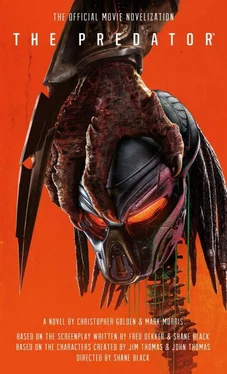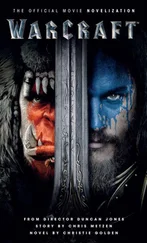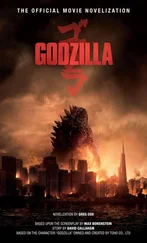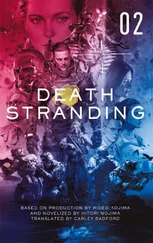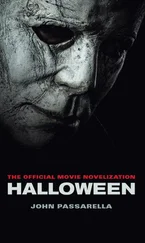Quiet, grim, ready for a fight and ready to be heroes, they hold on as the troop transport whipsaws into a turn.
Only one among them, Harry Curtis, Jr., hears the muffled thump on top of the truck. Junior glances up, but only for a moment. It could be anything or nothing—could be his imagination.
The Predator swings down into the truck bed. Spinning blades reminiscent of Japanese throwing stars fly from its fingers and two mercenaries go down. Then its blades come out. Harry opens his mouth to shout, tries to reach for his weapon, but the Predator’s gauntlet blades crunch through his ribcage and cleave his heart in a single motion. His brain continues to receive signals for half a second; long enough for him to see another merc die before his body realizes his life is over.
Corpses slump in their seats. Blood drips onto the truck bed. The Predator slides the last body to the floor with the quiet precision of a born hunter.
Still, somehow, the driver senses something. Perhaps he smells the blood, or the silence of death is an alarm bell all its own.
“Everything okay back there?” he asks uneasily, peeking in the rearview mirror. Into shadows.
In what little light makes it into the rear of the truck, he spots a thumbs-up from one of the mercenaries. It eases his mind, and he returns his attention to the road.
In the back, the Predator lowers Harry Curtis, Jr.’s severed arm. The alien sits back, removes his mask, and allows himself to relax and enjoy the ride, as the blood continues to pool at his feet.
* * *
In a forest clearing not far from the Stargazer base, the alien vessel squats among surrounding trees like a coiled snake awaiting passing prey. Steam rises from its sleek surface, but disperses among the trees before it can rise high enough to give away the craft’s position.
The hatch of the craft opens and a massive figure emerges, before climbing down to the forest floor. The figure stands impossibly tall, the shifting light and shadow of the night playing across its formidable body. This creature is different to the one that earlier that night had caused untold havoc at Project: Stargazer. Like the Predator, but something more.
An upgrade. That is how it thinks of itself. Something better.
It raises its head and utters a high, oddly musical chitter. Two silhouettes, stocky, rangy and powerful, slink out of the brush, padding forward on all fours.
From its tunic, the Upgrade produces a piece of mesh-like material, perhaps a scrap of clothing, which moves in the creature’s taloned hand with a slithering motion, catching the light. The Upgrade crouches down and holds out the scrap of mesh. Its two companions, shoulder muscles rippling with panther-like grace, move forward like tracker dogs to sniff it.
Rory sat in his basement in an old BarcaLounger that had once been his dad’s favorite chair. One of his earliest memories was of his dad reaching down and scooping him up into the chair, plopping Rory on his lap, and the two of them watching the original Star Wars together. Rory figured he couldn’t have been more than two years old at the time. His father hadn’t been around much, but most of his earliest memories of his dad had imprinted on some part of his brain that made him happy and sad at the same time. He remembered his dad taking him along on a Sunday afternoon when he’d gone to play basketball with some of his friends. Rory had been four or five, old enough to sit and behave himself in the bleachers and watch his dad and the other men play. Just some guys in a smelly school gymnasium, pretending they were still in high school, but for those two hours, Rory loved them all. When the game was over, and the men took turns hoisting him onto their shoulders so he could try to throw the ball into the basket—that was the only time he could remember ever caring about sports.
Those memories—the times his father had acted like a dad—shouldn’t have made up for all the absence and neglect. Most days, nothing could make up for that. Rory understood the way the fabric of things wove together, like numbers and language and mechanics, and he knew his father should have been a larger part of his life, that it made a difference. But he could never have put his disappointment into words his parents could have understood. It was as if his ability to evaluate his father’s parental performance existed in a locked room, and he knew he’d never find the key. All he knew was that it didn’t feel right; that far too often he was left feeling hollow, and yet a part of him understood this wasn’t fair. Rory’s brain had been wired differently from birth, and he thought—in his way—that Quinn McKenna had also been wired differently.
He was who he was.
Sometimes, especially on nights like this, when Rory sat in the BarcaLounger and remembered Star Wars and basketball—and when he had questions he needed answers to, but didn’t want to ask his mom—his memories of his father were enough for him, and he was just a regular kid who missed his dad.
Rory wasn’t sure of the time, but he knew it was late. He felt a little cold, down in the basement. In his right hand, he held a tiny keychain viewer with a little button that turned a light on inside it. Peering into the eyehole, he glanced again at the photo inside—a picture of himself and his dad. In the photo, they were both laughing. Rory didn’t remember the picture being taken. He wished he could remember.
He lowered the keychain viewer and glanced over at the tattered ottoman nearby. The helmet sat there, its blank eyes seeming to watch him. Beside it was the black doohickey that he’d popped out of the alien wrist gauntlet. It looked like some kind of tiny coffin or a miniature Lost Ark or something, except for the buttons and lights all over it.
Rory had never wished for his father’s presence more than he did right now. Where had his dad found these things? What were they? Obviously, they were a secret, because this sort of thing didn’t just get mailed from Mexico to an Army Ranger’s private PO box every day, but what was the story behind them? Rory felt like that information would have been very useful to him in his efforts to figure out how to use the doohickey.
He leaned out of the Barcalounger and grabbed it, then sat back and tapped buttons, trying to wake it up again. At first nothing happened. He frowned and toyed with it some more, felt pleased when the lights glowed red, but then he began to chew on his lip. What next? He felt like his understanding of this instrument and the language behind it was just out of reach, that he could learn to translate it all with just a little push, a little more insight.
The lights flickered. He thought he saw a pattern in their sequence and tapped again.
A series of 3D projections burst from the helmet, making Rory jump. They flashed by quickly, but Rory read them as instantly as they appeared, capturing every one of them in his mind, sorting them the way he sorted mechanics or the way he saw every move in a chess game—or five chess games—before the first few pieces had even been taken off the board.
The projections were three-dimensional graphics of a spacecraft and its controls. Buttons, switches, gauges, star maps, a virtual-reality owner’s manual that whizzed by faster than any ordinary human brain could parse. The 3D image flickered to a view of the Earth, as seen from space, which Rory guessed was not something from the owner’s manual, but was either the view from the spacecraft right now or a recent recording. Something blinked red on the planet as the image zoomed in. Landmasses grew closer. North America; the southern United States; Mexico. Then the image became a map, landmarks getting bigger and clearer, as the tracker, or remote camera, or whatever, rushed closer and closer to the ground.
Читать дальше
